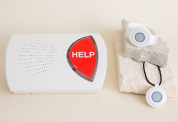What Does In-Home Dementia Care Cost?
June 11, 2024
What Is In-Home Dementia Care?
In-home dementia care is a type of service designed to support individuals with dementia in the comfort of their own homes. This form of care helps maintain a sense of familiarity and routine for those living with dementia, which can be crucial for their overall well-being. By providing personalized care in a familiar environment, in-home care allows individuals to retain a higher level of independence and comfort compared to institutional settings. But what does in-home dementia care cost? It depends on the type of services you need an how often you need them.
What Services Can In-Home Dementia Care Provide?
In-home dementia care services are tailored to meet the unique needs of individuals with dementia. These services can range from basic assistance with daily activities to more comprehensive care. Here is a bullet list of services typically provided by in-home dementia care:
- Personal Care: Assistance with bathing, dressing, grooming, and toileting.
- Medication Management: Ensuring that medications are taken correctly and on schedule.
- Meal Preparation: Planning and preparing nutritious meals, including assistance with feeding if needed.
- Mobility Assistance: Helping with walking, transferring from bed to chair, and other mobility needs.
- Companionship: Providing social interaction and emotional support to combat loneliness and isolation.
- Household Tasks: Light housekeeping, laundry, and other household chores.
- Transportation: Accompanying individuals to medical appointments, errands, and social activities.
- Supervision: Ensuring the safety of individuals, preventing wandering, and managing behavioral issues related to dementia.
In-Home Care vs. Long-Term Memory Care Facilities
When considering dementia care options, it is important to understand the differences between in-home care and long-term memory care facilities.
In-Home Care
- Personalized Care: Caregivers provide one-on-one attention, tailored to the individual’s specific needs.
- Familiar Environment: Individuals stay in their own homes, surrounded by familiar settings and possessions.
- Flexibility: Care plans can be adjusted as needs change, with services ranging from a few hours a day to 24/7 care.
- Family Involvement: Families can remain actively involved in the care process, providing support and oversight.
Long-Term Memory Care Facilities
- Specialized Staff: Facilities often have trained staff specifically for dementia care, providing specialized medical and therapeutic services.
- Structured Environment: These facilities offer structured schedules and activities designed to stimulate cognitive function and provide routine.
- Social Interaction: Residents have the opportunity to interact with others in similar situations, promoting socialization and community.
- On-Site Medical Care: Access to medical professionals and emergency care is typically available on-site.
Long-Term Memory Care Costs
The cost of long-term memory care facilities can vary widely depending on location, level of care required, and the specific amenities offered by the facility. On average, monthly costs for memory care facilities can range from $4,000 to $10,000. Some high-end facilities with extensive services and luxurious amenities can exceed this range, while more basic facilities may offer lower rates. It is essential for families to research and visit multiple facilities to understand the full range of services and costs involved.
What Does In-Home Dementia Care Cost Per Hour?
In-home memory care costs are typically calculated on an hourly basis, allowing for more flexibility in the level of care provided. The hourly rates for in-home care can vary depending on factors such as geographic location, the caregiver’s qualifications, and the complexity of care needed.
On average, hourly rates for in-home dementia care range from $20 to $40 per hour.
For families requiring 24/7 care, this can translate into significant monthly expenses, often comparable to or exceeding the cost of long-term memory care facilities.
However, the ability to customize the number of hours and type of care can help manage costs more effectively. For instance, some families may only require part-time care or care during specific times of the day, which can reduce overall expenses.
Getting Started with In-Home Dementia Care
Creating a Dementia Care Plan
A dementia care plan is essential for providing structured and consistent care. This plan should include:
- Assessment of Needs: Identify the specific needs and preferences of the individual with dementia. This includes medical requirements, personal care needs, and social preferences.
- Caregiver Roles: Clearly define the roles and responsibilities of each caregiver, whether family members or professional aides.
- Daily Routine: Establish a daily routine that provides structure and reduces anxiety for the person with dementia.
- Emergency Contacts: Maintain a list of emergency contacts, including healthcare providers and family members.
- Regular Reviews: Periodically review and adjust the care plan to adapt to the evolving needs of the individual.
Using Assistive Technology
Assistive technology can play a crucial role in enhancing the safety and quality of life for individuals with dementia. These technologies include:
- GPS Tracking Devices: Wearable devices that can track the location of individuals, helping to prevent wandering.
- Smart Home Systems: Systems that monitor movement and activities within the home, providing alerts to caregivers if unusual behavior is detected.
- Medication Reminders: Devices that remind individuals to take their medication on time, ensuring adherence to prescribed regimens.
- Safety Alarms: Alarms on doors and windows that alert caregivers if the individual attempts to leave the home unsupervised.
Integrating these technologies into your dementia care plan can significantly reduce risks and enhance the overall safety of the individual with dementia.
Making the Right Choice
Deciding between in-home dementia care and long-term memory care facilities is a deeply personal choice that depends on the individual’s needs, family circumstances, and financial situation. Here are some factors to consider:
- Level of Care Needed: Evaluate the level of care and supervision required. Individuals with advanced dementia may benefit more from the specialized services offered by memory care facilities.
- Cost: Compare the costs of in-home care versus memory care facilities, keeping in mind the potential for unexpected expenses.
- Quality of Life: Consider the impact on the individual’s quality of life, including their comfort, social interaction opportunities, and access to medical care.
- Family Dynamics: Assess the ability of family members to provide support and oversight if opting for in-home care.
In summary, both in-home dementia care and long-term memory care facilities offer distinct advantages and challenges. Understanding the costs and services associated with each option is crucial in making an informed decision that best meets the needs of your loved one.






